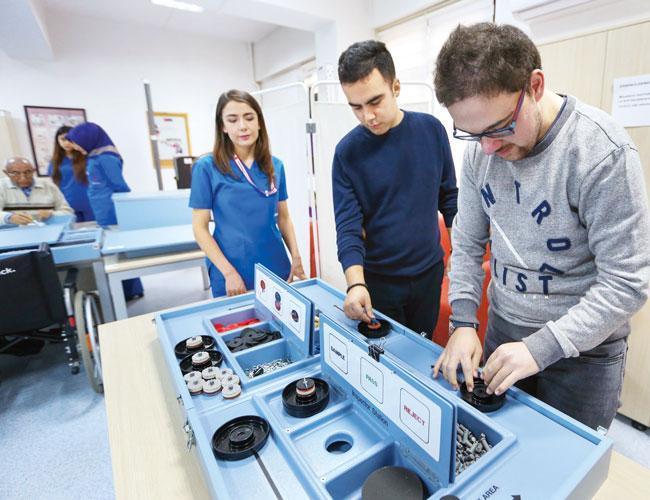
The Hacettepe Center for Vocational Rehabilitation in the capital Ankara, which trains individuals with disabilities to improve personal skills and practices that will enable them to find jobs, has so far provided trainings for 150 people with disabilities since its establishment two years ago.
The center was established as part of the “Technical Assistance for Increasing the Employability of People with Disabilities” project, which is co-financed by the EU and Turkey with a budget of 4.5 million euros. The beneficiary of the project is Hacettepe University Faculty of Health Science’s Occupational Therapy Department and the contracting authority is the Labor and Social Security Ministry.
The overall objective of the project is to increase working capacity, motivation, productivity, job search skills and social skills of individuals with disabilities to increase their chances at employability and facilitate their access to the labor market.
According to a research undertaken by the Turkish Health Ministry and the World Health Organization (WHO) in 2006, some 12 percent of the Turkish population consists of individuals with disabilities, an official at the Hacettepe Center for Vocational Rehabilitation said.
But there is still no data on the percentage of disabled people who have jobs, Orkun Aran, an academic at Hacettepe University’s Department of Occupational Therapy told daily Hürriyet on Dec. 3, the International Day of Persons with Disabilities.
According to Turkish labor law, at least three percent of enterprises where more than 50 people are employed need to be people with disabilities. Some 41,000 individuals with disabilities throughout this year applied to the Turkish Employment Agency (İŞKUR) in Ankara, according to official figures, but there is no data yet as to how many of them have secured jobs, said Aran.
‘Employers do not prefer the disabled’
“In this period, when the unemployment rate is already high in Turkey, it gets even more difficult for a disabled person to find a job. Employers do not prefer to employ disabled people. There are loopholes in the law,” said Aran.
“Our aim is to increase the abilities of the disabled individuals for them to find a job and to establish a rehabilitation model that will make them more powerful in the labor market. Many employers think: ‘Let them sit aside.’ The attitude is such that if the person is hearing-impaired, let them work at a noisy warehouse, or if the person is visually-impaired, let them answer phone calls,” he said.
The center helps individuals with disabilities to choose a job sector that is appropriate for them, to look for a job, and to connect with the relevant employers, according to Aran. So, not only does the center equip the participants with the relevant skills for the job, but also teaches them how to prepare a resume, how to conduct a job interview, and what awaits them in the employment sector, said Aran.
“We are working jointly with İŞKUR’S consultant centers in [Ankara’s districts of] Altındağ, Çankaya, Ostim, and Sincan. We are first undertaking a comprehensive analysis, we are finding out about the person’s abilities, what they experienced so far in their lives as well as regarding their disability,” he said.
There are currently 25 people who are continuing their trainings in the center. One of them is Canberk Demirel, who is 23 years old.
“His [Demirel’s] family told us about his aunt’s plans to open a café and her plans to have Canberk work there. We have listed the parameters for this and completed the simulations, such as serving tea or counting money,” said one of the occupational therapists at the center.
“I am trying to learn about money issues. I love things about shopping and doing calculations. Now [thanks to the trainings], I can go to a market and get my change money in a right way. I love my trainers and they love me,” Demirel said.
Another student of the center is Oğuzhan Aktaş, 23 and who currently works as a receptionist at the Altındağ Municipality. A part of Aktaş’s body was left paralyzed after he fell from the third floor of an apartment building when he was only 14 months old.
“Teachers called me to the center. My training period lasted about one-and-a-half years. I have met other friends there. They have given me morale and advised me about finding my dream job,” Aktaş said, whose wish is to open his own fitness salon.
The head of Hacettepe University’s Department of Occupational Therapy, Hülya Karahan, advised disabled individuals’ parents not to be “overprotective.” “We are in the wrong if we think that we, as typical individuals, can do anything. Similarly, we are again in the wrong that disabled individuals cannot do anything. The overprotective structure leads to disabled individuals to be stuck in a glass,” she said.